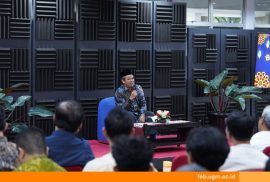Plastic is a material that is often used by people around the world, one of which is in Indonesia. The ease of using plastic allows people to always make use of it in their daily activities. However, this is harmful to the environment. Therefore, some figures began to introduce the concept of a circular economy to reduce existing waste. To discuss and increase awareness of this, Faculty of Economics and Business UGM brought up the topic “Circular Economy in Indonesia” in International Week (I-Week 2021) on Friday (30/07/21).
The event invited Paola Cortese, Country Manager of Plastic Bank Indonesia, to share her insights regarding the circular economy with students. The event was guided by Achmad Masyhadul Amin, S.E., M.Sc., Lecturer of the Accounting Department, as a facilitator.
In her presentation, Paola said that plastic waste in Indonesia is very high and has a negative impact on the environment. Some researchers have even said that it takes approximately 500 years to decompose plastic waste on the earth. Therefore, over time, the concept of a circular economy was created, which focused on reducing waste and pollution as well as preserving product materials so that they can be reused.
The circular economy has the slogan “waste = food” which means that waste from a production or consumption process can be an input to be used in the next process and continues perpetually. This is different from a linear economy which has the slogan “take, make, and dispose.”
Several factors are driving the circular economy externally and internally. External driving factors include consistent policies to support the implementation of a circular economy, good tax regulations, and consumer specifications. While the internal driving factors are corporate responsibility, shareholder pressure, competitiveness, good culture, and behavior.
In addition, there are also external and internal obstacles to the implementation of a circular economy. External obstacles include unsupportive government policies, lack of consumer demand, limited supply chains, and limited technology and infrastructure. While from the internal side, namely the existence of a very commercial business model to culture and attitude that does not support it. Paola revealed that in Indonesia there are obstacles in the recycling sector, including the lack of regulation and implementation, cultural misperceptions related to waste, the lack of household participation, and the lack of demand for recycled products.
Even so, in Indonesia, there have been several initiatives to support the circular economy, such as the use of eco blocks or environmentally friendly construction blocks derived from plastic waste to build a school in Lombok. Then, there is also a plastic bank to help reduce plastic waste in the sea and have an environmental and social impact. Not to forget, Paola also said that to contribute to the implementation of a circular economy, you can start with yourself.
Reportage: Zahra Dian




